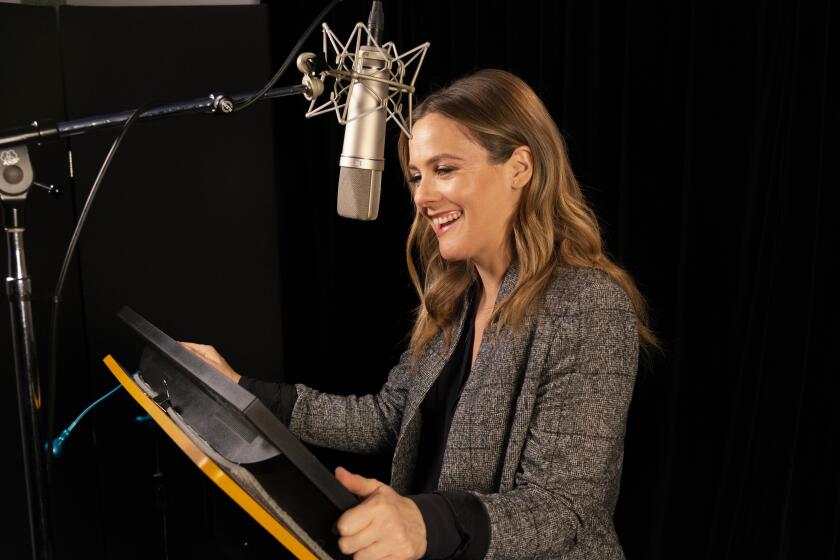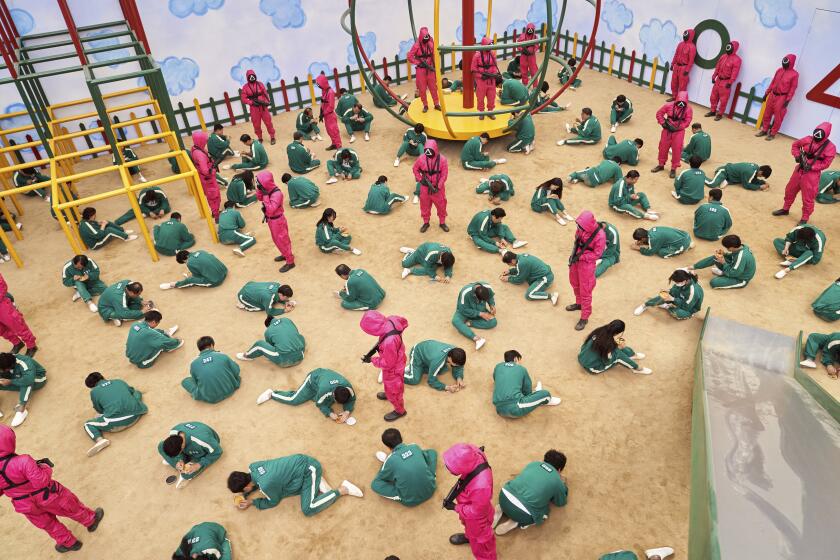L.A. Taco’s podcast on disgraced Councilman Jose Huizar argues there’s a bigger villain
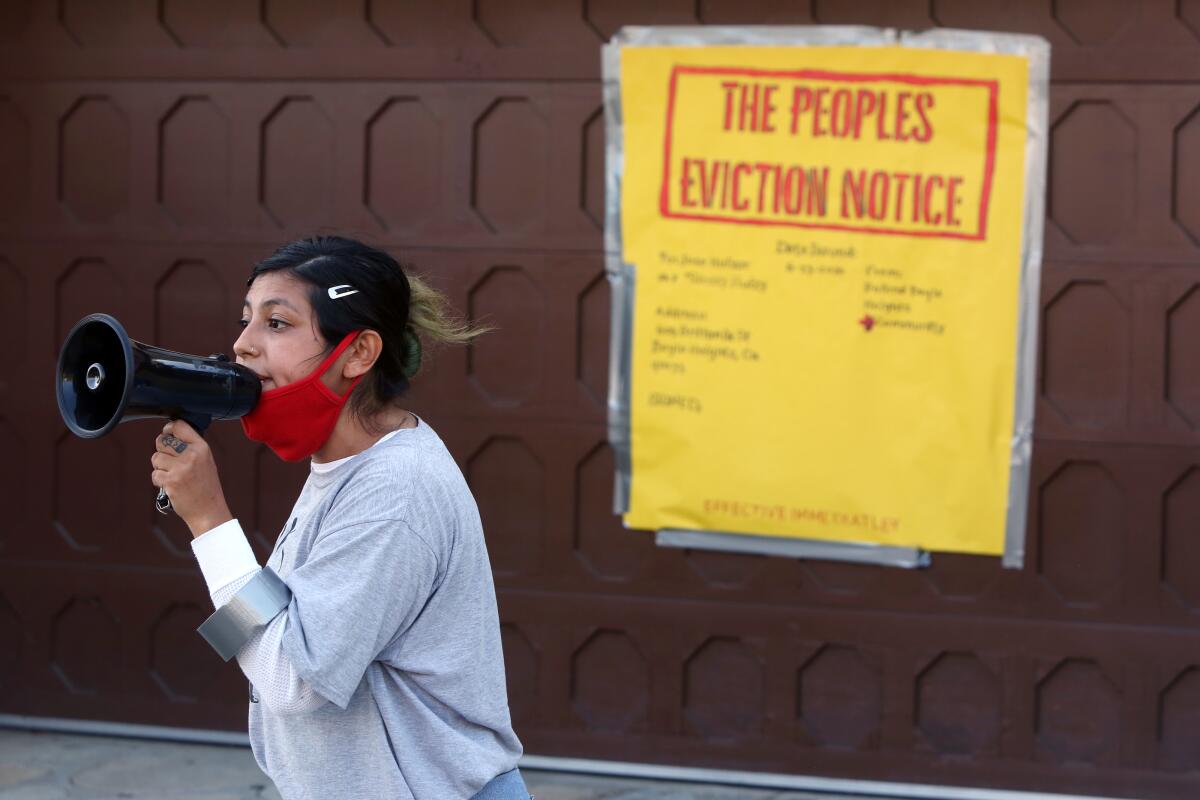
- Share via
A typical true-crime podcast might have started its story about a city council member’s arrest like this: In Episode 1, you’d get some exposition about how, for years, So-And-So was a powerful figure on the political scene, winning election after election to wield formidable influence in the halls of government. So-And-So had made some enemies; he had also made some powerful friends. His future, the true-crime podcast might argue, seemed bright.
Then, one day (music starts playing to indicate a dramatic twist), Federal Bureau of Investigation agents show up at the council member’s home and offices with search warrants, hauling away boxes of potential criminal evidence. Soon after, So-And-So is in handcuffs. The episode probably ends with a narrator teasing the explosive allegations to be explored in the following episodes, promising to delve into the details of how it all went wrong.
But a new podcast series about indicted former L.A. City Councilman Jose Huizar, which released its ninth and final episode Tuesday, has ditched the usual true-crime formula for a more communal story about life, power and change in Los Angeles. It’s a local story told only as local indie media outlet L.A. Taco, which helped make the show with podcast company Neon Hum Media, might tell it.
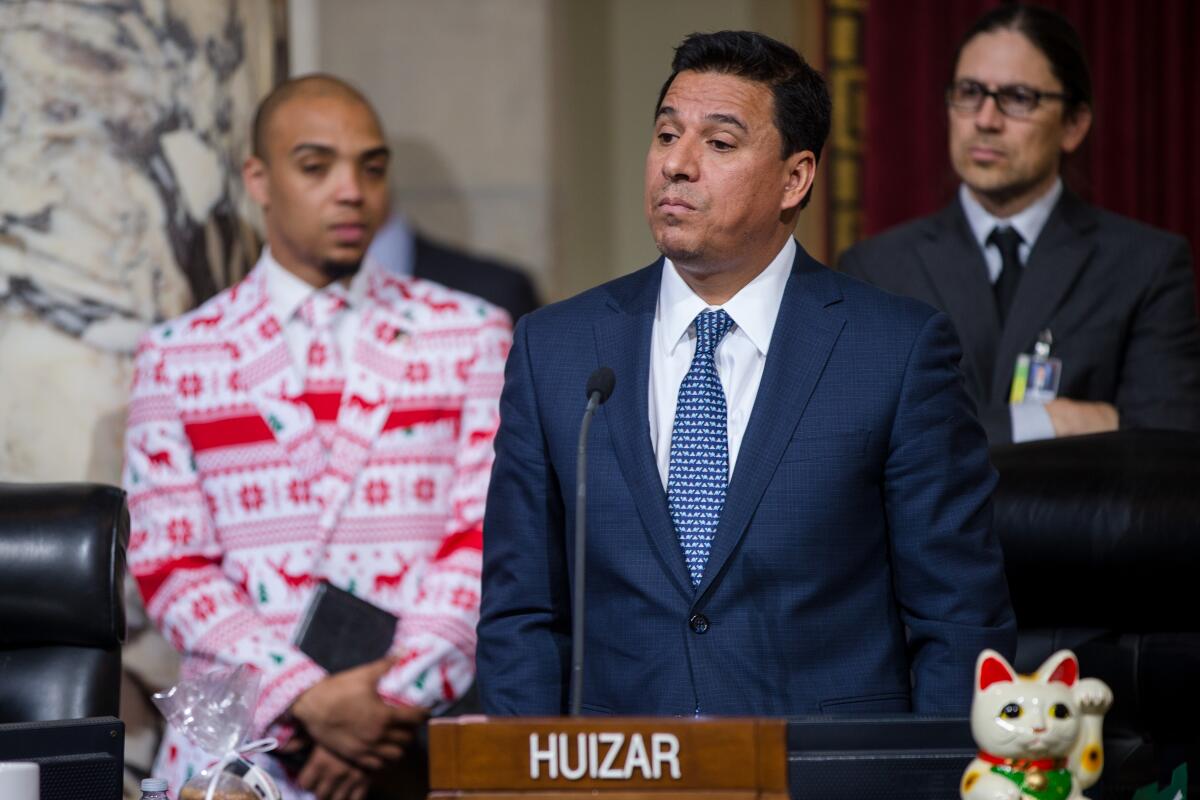
Instead of starting with the June 2020 arrest of Huizar — a native of Zacatecas who became L.A. City Council’s first Mexican-born member — “Smokescreen: The Sellout” opens the story in his largely Latino neighborhood of Boyle Heights, with L.A. Taco editor-at-large Mariah Castañeda narrating conversationally about the mariachis and local teenagers battling landlords and opera-singing gentrifiers in Huizar’s district.
“We set out to tell the story of a place as much as a man,” said Catherine Saint Louis, the Brooklyn-based executive editor of Neon Hum Media, which is backed by Sony Music. “We wanted people who are experiencing gentrification wherever they’re experiencing gentrification in America to see something of themselves in the podcast.”
To be clear, in the still-pending criminal case between Huizar and federal law enforcement, the podcast takes a lengthy look and picks a side. Huizar, who was charged with taking bribes from developers seeking to build in his district downtown, is, after all, the podcast’s titular sellout. The podcast explores the sexual harassment allegations made by a former aide, Francine Godoy, which culminated with a private $600,000 settlement that, prosecutors say, Huizar paid with a loan secured by a Chinese billionaire doing business in his district. In an editorial touch emblematic of L.A. Taco’s foodie-influenced approach, reporter Lexis-Olivier Ray wrote a companion piece about all the restaurants where prosecutors say Huizar met with developers while conducting illicit business.
But in the end, although Huizar is the show’s antagonist, gentrification is its true villain.
“I care more about how the community was impacted, less about the juicy gossip,” Castañeda said in an interview. “For me as a Latina myself, I think it’s kind of sad when somebody doesn’t act with the constituents in mind.”
The show, which was reported by journalists from both L.A. Taco and Neon Hum Media, argues that Huizar’s potentially illegal coziness with developers while on City Council from 2005 to 2020 helped cause the rapid development in downtown L.A. that also brought “aftershocks” of gentrification in adjacent Boyle Heights. The show tries to directly connect backroom deals for downtown developments with the suffering of working-class renters across the L.A. River, and it also argues Huizar himself was put into a position ripe for moral failure.
“In Los Angeles, you could say that your City Council member has too much control over the kinds of things that get built in your neighborhood,” narrates Castañeda in the show’s final episode, referring to the City Council’s practice of deferring to council members’ wishes about approving projects in their own districts. “Your City Council member, all by themselves, can stand in the way of a development or fast-track it through. And when you’ve built a local government where one corruptible person stands between millions of dollars wasted or millions or dollars well spent, corruption is a feature and not a bug.”
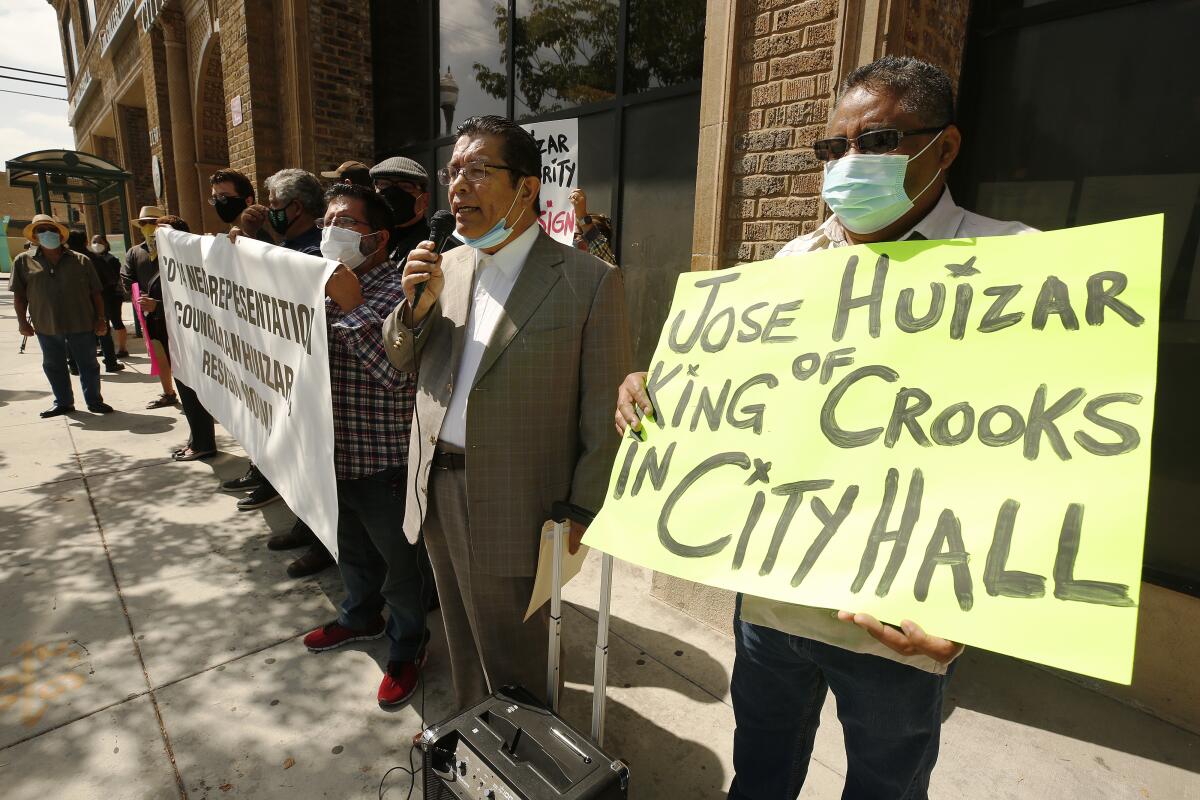
Alongside the show’s final episode on Tuesday, L.A. Taco published a companion piece telling readers about different organizations readers can join to fight tenant displacement, including tenants unions.
What Huizar might think of all this isn’t known. Like many other prominent figures closely involved with his most controversial years in office, Huizar, who has pleaded innocent to all charges, declined to participate in the podcast, and his attorneys did not respond to a request from The Times for comment. He hasn’t tweeted for more than a year.
Huizar’s defense of his innocence, as offered in court so far, gets only a passing reference in the final episode of the show, whose episodes draw liberally from federal prosecutors’ filings against him.
In a recent filing, Huizar’s attorneys offered a counternarrative about his time in office and what downtown development meant for Boyle Heights. Huizar, they said, was an “evangelist for robust development,” who “saw it as his responsibility to bring hotels, apartments, jobs, tourism, and entertainment to the urban core.” Huizar’s view was that with urban development, they argued, came more residents, businesses and customers whose tax dollars could fund programs to benefit low-income tenants and unhoused residents in neighborhoods like Boyle Heights. (And voters had overwhelmingly rewarded him: In 2015, after 10 years in office, and after Godoy’s allegations against him had become public knowledge, Huizar won nearly two-thirds of the vote, with backing not just from business but also labor.)
But above all, Huizar’s attorneys, attempting to gut the prosecution’s case and portray it as legally shoddy, have argued that the prosecution hasn’t proved Huizar used his office corruptly in exchange for what they acknowledge as “unseemly behavior.” This is significant under recent U.S. Supreme Court precedent, which has increasingly narrowed when taking money constitutes bribery in a system of democracy where public officials are expected to engage with special interests on issues of public policy.
“From filling potholes to approving skyscrapers, that often means playing favorites and choosing sides,” Huizar’s attorneys argued. “It also means brokering deals — between affordability and growth, between competing factions, between idealistic demands and budgetary realities.” They have argued a judge should throw out most of the charges against him.
Federal prosecutors were indignant to these claims in their own response, saying Huizar “got greedy, got brazen, got sloppy, and got caught.” The judge in the case has not yet issued a ruling on whether to throw out the charges.
The show’s team said they might continue to follow the case as it proceeds toward a trial. “We’ve already got another super meaty investigation going on one aspect of Jose Huizar that will fill in the blanks until the trial happens, then we will be covering the trial in the podcast feed,” Saint Louis said.
Saint Louis said the show is financially supported in part by ads and by some premium subscription offerings as well as Sony Music’s corporate backing. “They’re taking a bet that somebody will want to make an HBO special of Jose Huizar and it will be valuable someday,” Saint Louis said. She declined to share numbers about the podcast’s popularity, but she said that L.A. Taco’s engaged local audience has been buzzing about the show.
“I’ve never had a podcast where every time I look at Twitter, there are multiple people talking about ‘The Sellout,’” Saint Louis said. “I’ve just never worked on a podcast like that.”
Castañeda said she hopes the show and its style inspires others. “I really hope that we can have more folks feeling empowered to really make content, whatever form, in media, that holds local politicians accountable and centers their own community,” she said. “I really want to encourage that, and I want folks to not feel like they have to sound super professional or super NPR.”
More to Read
The biggest entertainment stories
Get our big stories about Hollywood, film, television, music, arts, culture and more right in your inbox as soon as they publish.
You may occasionally receive promotional content from the Los Angeles Times.
